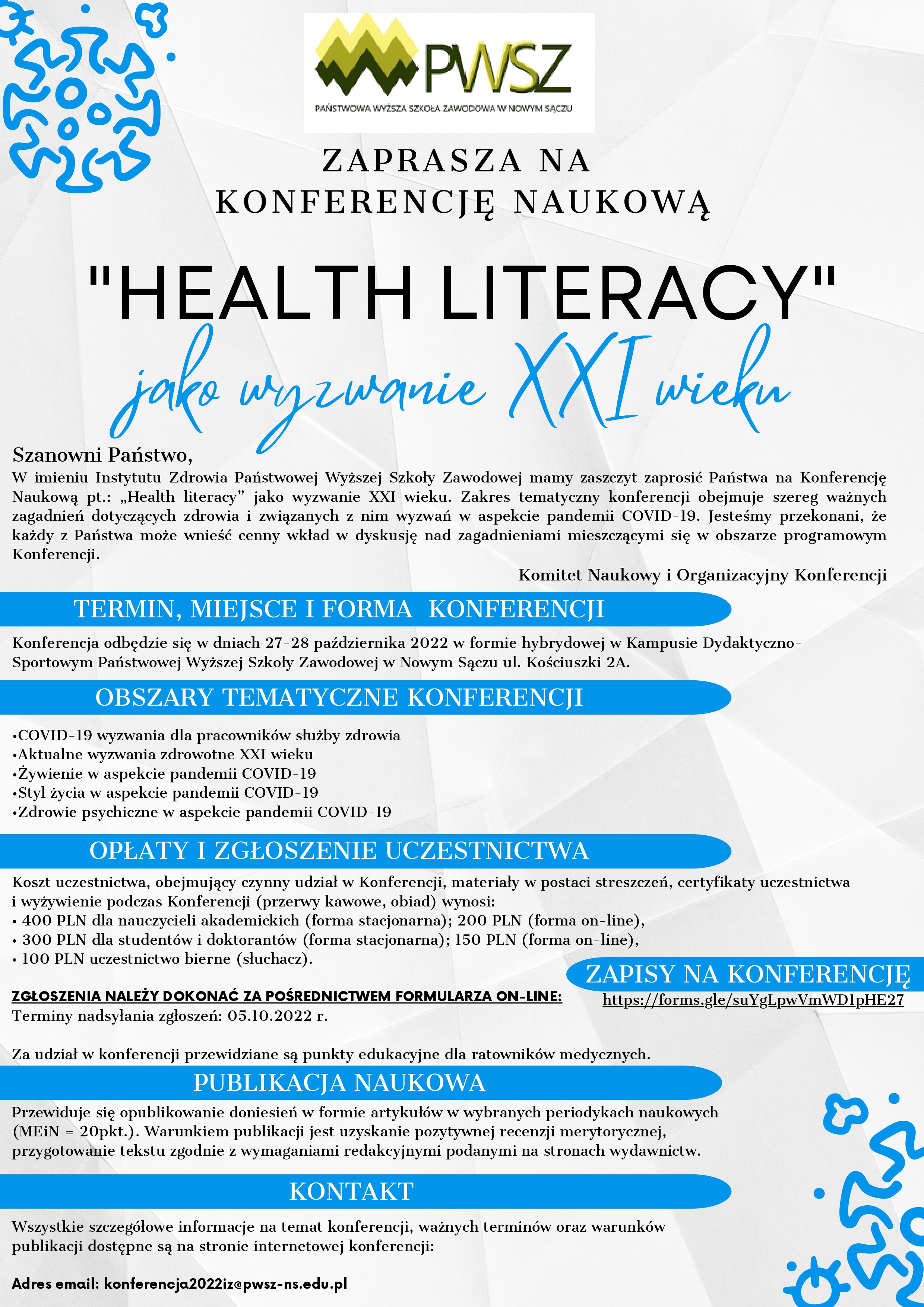The impact of the COVID-19 pandemic on the lifestyle of students of the State University of Applied Sciences in Nowy Sącz
DOI:
https://doi.org/10.12775/JEHS.2023.13.S2.007Keywords
dietary habits, students, COVID-19, body mass indexAbstract
Introduction
A properly balanced diet and physical activity guarantee health and good psychophysical condition. The timing of the pandemic is associated with numerous limitations affecting food preferences and physical activity.
Aim
The study aimed was to determine the impact of pandemic isolation on student activity and dietary habits during COVID-19 isolation.
Material and methods
The study group consisted of students (n = 526) of the State University of Applied Sciences in Nowy Sacz. The research was an online survey (Google Forms). The questions included in the questionnaire concerning dietary habits and physical activity. Based on the data provided by the students, the body mass index (BMI) was calculated before and during the pandemic.
Results
Young women (n = 388) living in rural areas dominated among the respondents. A significantly higher mean BMI value was observed in men compared to women (p <0.05). However, no significant changes in the value of BMI were observed before and during the pandemic, both in women and men. On the other hand, its higher average value was observed for men and women living in the city compared to those living in the countryside. The impact of the pandemic on the reduction of physical activity was observed by all respondents, especially those living in the city. Women noted a greater impact of the pandemic on eating behavior, compared to men.
Conclusions
The COVID-19 pandemic changed the dietary habits and physical activity of students at the State University of Applied Sciences in Nowy Sacz.
References
Andrzejewski A. Kompulsywne nadużywanie mediów społecznościowych a ryzyko rozwoju zaburzeń odżywiania – na przykładzie aplikacji Instagram. Annales Universitatis Mariae Curie-Skłodowska Lublin – Polonia 2018; 243-254. https://doi.org/ 10.17951/j.2018.31.2.243-254.
Cooper M., Reilly E. E., Siegel J. A., Coniglio K., Sadeh-Sharvit,S., Pisetsky E. M., Anderson L. M. Eating disorders during the COVID-19 pandemic and quarantine: An overview of risks and recommendations for treatment and early intervention, International Journal of Eating Disorders 2020; 1-11. https://doi.org/10.1002/eat.23353.
Fernández-Aranda F., Casas M., Claes L., Clark D., Bryan D. C., Favaro A., Granero R., Gudiol C., Jiménez-Murcia S., Karwautz A., Daniel Le Grang D., Menchón J.M., Tchanturia K., Treasure, J. COVID-19 and implications for eating disorders, European Eating Disorders Review 2020; 28(3), 239–245. https://doi.org/ 10.1002/erv.2738.
https://ncez.pzh.gov.pl/aktywnosc-fizyczna/nowe-zalecenia-who-dotyczace-aktywnosci-fizycznej/ [dostęp: 30.10.2022].
https://www.benefitsystems.pl/o-nas/biuro-prasowe/komunikat/multisport-index-2020-73-proc-aktywnych-fizycznie-polakow-chce-uprawiac-sport-niezaleznie-od-rozwo/ [access: 18.10.2022].
[access: 02.11.2022].
Kozłowska K., Śnieżek A., Winiarska-Mieczan A., Rusinek-Prystupa E., Kwiecień M. Wpływ czynników stresogennych na odżywianie, Problemy Higieny i Epidemiologii 2017; 98(1): 57-62.
Kułak-Bejda A., Harasim-Piszczatowska E., Bejda G., Waszkiewicz N., Krajewska-Kułak E. Postrzeganie własnego ciała przez kobiety, Hygeia Public Health 2017; 52(2): 171-182.
Lubelska K., Kolekcjonerzy dusz, Tygodnik Polityka 2009; 2722.
Mitchell E., Yang Q., Behr H., Deluca L., Schaffer P. Adherence to healthy food choices during the COVID-19 pandemic in a U.S. population attempting to lose weight, Nutrition, Metabolism and Cardiovascular Diseases 2021; 2167-2172. https://doi.org/ 10.1016/j.numecd.2021.03.009.
Ordoñez-Araque R., Caicedo-Jaramillo C., García-Ulloa M., Dueñas-Ricaurte J. Eating habits and physical activity before and during the health emergency due to COVID-19 in Quito – Ecuador. Human Nutrition & Metabolism 2021; 24, 200122. https://doi.org/ 10.1016/j.hnm.2021.200122.
Rasińska R., Nawyki żywieniowe studentów w zależności od płci, Nowiny Lekarskie 2012; 81(4), 354-359.
Sidor A., Rzymski P., Dietary choices and habits during COVID-19 Lockdown: Experience from Poland, Nutrients 202; 12 (6), 1657. https://doi.org/ 10.3390/nu12061657.
Simone M., Emery R., Hazzard V. Eisenberg M., Larso, N., Neumark-Sztainer D. Disordered eating in a population‐based sample of young adults during the COVID‐19 outbreak, International Journal of Eating Disorders, 2021; 54(7), 1189-1201. https://doi.org/ 10.1002/eat.23505.
Termorshuizen, J., Watson H., Thornton L., Borg S., Flatt R., MacDermod C., Harper L., Van Furth E., Peat C., Bulik C. Early impact of COVID ‐19 on individuals with self‐reported eating disorders: A survey of ~1,000 individuals in the United States and the Netherlands, International Journal of Eating Disorders 2020. https://doi.org/ 10.1002/eat.23353. From https://www.researchgate.net/publication/343262209_Early_impact_of_COVID_19_on_individuals_with_selfreported_eating_disorders_A_survey_of_1000_individuals_in_the_United_States_ and_the_Netherlands/link/5f99c0f592851c14bcf074d5/ [access: 28.10.2020].
Touyz S., Lacey H., Hay P. Eating disorders in the time of COVID-19, Journal of Eating Disorders 2020; 8:19. From z https://d-nb.info/1212937600/34 [access: 28.10.2021].
Wang C., Pan R., Wan X., Tan Y., Xu L., Ho C. S., Ho R. C., Immediate psychological responses and associated factors during the initial stage of the 2019 coronavirus disease (COVID-19) epidemic among the general population in China, International Journal of Environmental Research and Public Health 2020; 17(5), 1729.
World Health Organization. (2020). Statement on the second meeting of the International Health Regulations (2005) Emergency Committee regarding the outbreak of novel coronavirus (2019-nCoV). From https://www.who.int/newsroom/detail/30-01-2020-statement-on-the-second-meeting-of-theinternational-health-regulations-(2005)-emergency-committee-regardingthe- outbreak-of-novel-coronavirus-(2019-ncov) [access: 15.10.2022].
Zborowski M., Mikulec A. Zachowania żywieniowe studentów Państwowej Wyższej Szkoły Zawodowej w Nowym Sączu podczas pandemii COVID-19. Nauka. Żywność. Technologia. Jakość. 2021; 28, 4 (129), 98 – 110.
Downloads
Published
How to Cite
Issue
Section
License
Copyright (c) 2023 Marek Zborowski, Anna Mikulec, Urszula Cisoń-Apanasewicz, Stanisław Kowalski

This work is licensed under a Creative Commons Attribution-NonCommercial-ShareAlike 4.0 International License.
The periodical offers access to content in the Open Access system under the Creative Commons Attribution-NonCommercial-ShareAlike 4.0
Stats
Number of views and downloads: 807
Number of citations: 0



